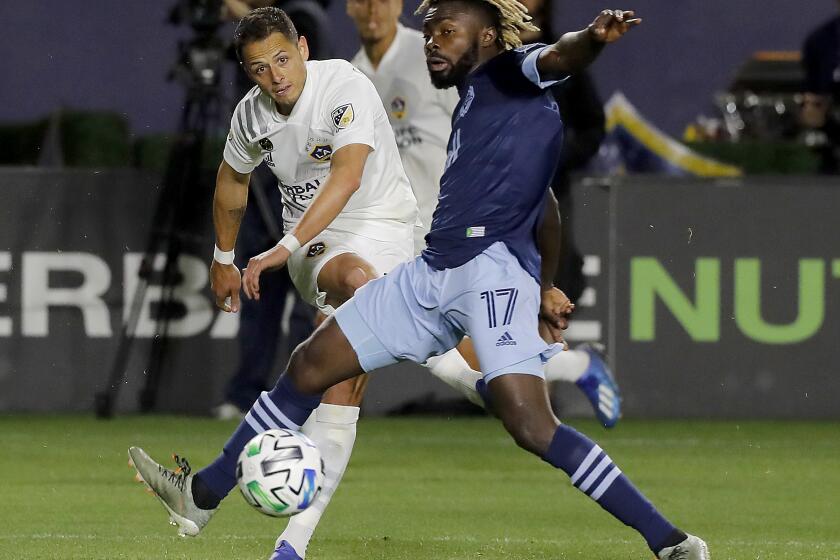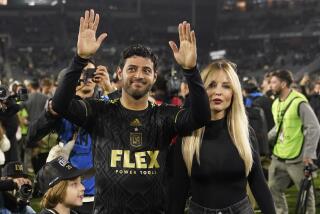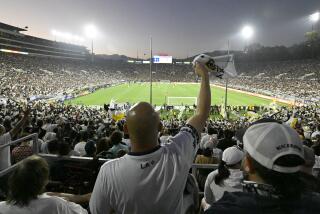LAFC’s Vela, Galaxy’s Chicharito skipping mandatory media sessions hurts MLS
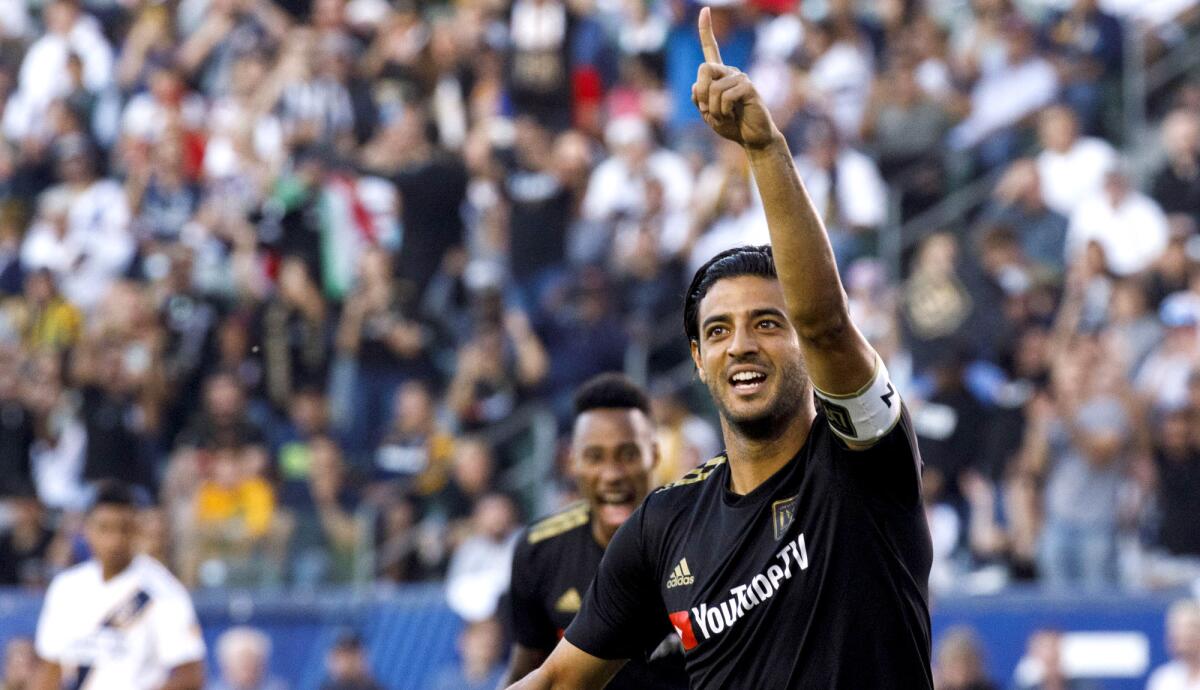
A couple of days before Javier “Chicharito” Hernandez’s MLS home debut, Galaxy captain Jonathan dos Santos was asked about the impact his teammate could have on the team and the league.
“This is Hollywood,” he said in Spanish. “The marketing in the United States, in soccer, is what sells the most. Having a public figure like Chicharito is always going to help draw attention to MLS, to have it be introduced not just in Mexico but all over the world.”
Two days later, the Chicharito market crashed. After a disastrous performance in Saturday’s loss to the Vancouver Whitecaps, Hernandez failed to show for a postgame news conference, where four dozen journalists and 18 TV cameras were waiting for him.
He wasn’t alone. The next day, Carlos Vela skipped out of Banc of California Stadium without talking after a brilliant game in which he extended his league record by scoring in a 12th consecutive home match during a draw with the Philadelphia Union.
Postgame media availability is mandatory in MLS and players who decline to show are subject to fines. That’s part of a policy designed to help the league — no better than fifth in popularity in a crowded professional sports landscape — compete for attention and allegiance.
It’s more important in Southern California, where Hernandez and Vela, two of the most popular players on the Mexican national team, are being counted on to blaze inroads into a Hispanic community that still prefers watching Mexico’s Liga MX on TV.
LAFC manages to rally back to force a draw with the Philadelphia Union in an exciting matchup featuring gutsy performances from both teams.
Mexican league games on the Univision family of networks routinely draw audiences of more than 1 million in the U.S. MLS averaged less than half that for its nationally televised games on the season’s opening weekend.
David Carter, an associate professor of Sports Business at the USC Marshall School of Business, said Hernandez and Vela offer both MLS and their teams a chance to raise their profiles, making the past weekend a missed opportunity.
“They tick many of the boxes,” Carter said. “There’s still a very large percentage of people in Southern California that would not be able to tell you who the star players on either team were. So there’s still a lot of work to be done in this very crowded market.”
A MLS spokeswoman said the league was aware of the situation but declined to comment on what actions might be considered. A league policy adopted in 2017 calls for teams to be issued a warning followed by an escalating series of fines when players do not comply with media obligations.
Despite that, Vela has spoken just twice since LAFC opened training camp two months ago.
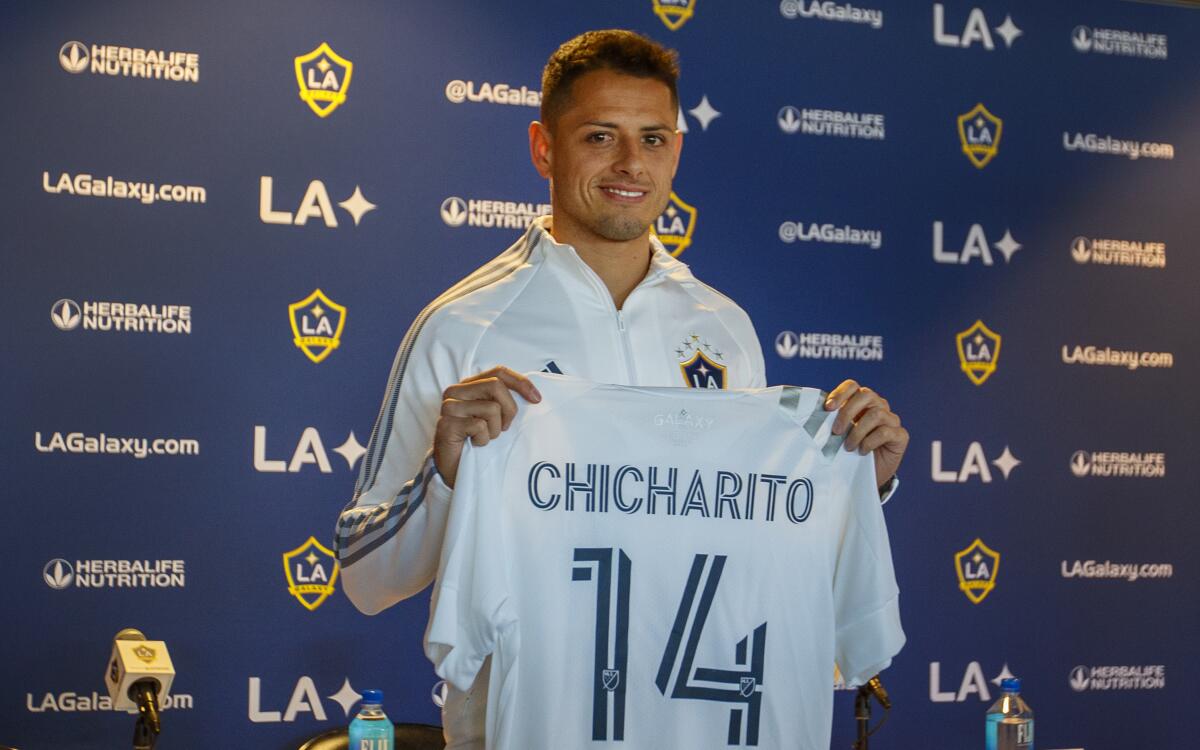
Hernandez, on the other hand, has been cooperative with reporters since joining the Galaxy, speaking on a weekly basis and making the rounds of the late-night talk shows ahead of last Saturday’s game, which drew the largest crowd for a home opener in five years.
Brendan Hannan, the team’s vice president of marketing and communications, said it was unfair to criticize Hernandez for skipping one news conference even if it was mandatory. He said the team, not Hernandez, made the decision he would not speak Saturday.
“He has fulfilled every media obligation in the six weeks that he has been with the Galaxy,” Hannan said.
The Galaxy’s Javier ‘Chicharito’ Hernández is held in check by the Vancouver Whitecaps, who win 1-0 on a goal in the 74th minute in Carson.
LAFC did not respond to calls seeking comment Monday but Larry Berg, the team’s leading managing owner, told an MLS audience last month that media attention is central to the league’s future, especially as it begins negotiations on a broadcast deal to replace one that currently pays MLS $90 million annually — the least-lucrative TV contract of the five major professional leagues.
“It will come down to the media deals,” Berg said. “Some of our sponsorships are fantastic, but if we can get some of the media deals to catch up in terms of magnitude, I think we’ll be a league of choice to a certain extent. Whether we can be a top-five league or a top-three league will really at the end of the day come down to money and our ability to compete for players.”

